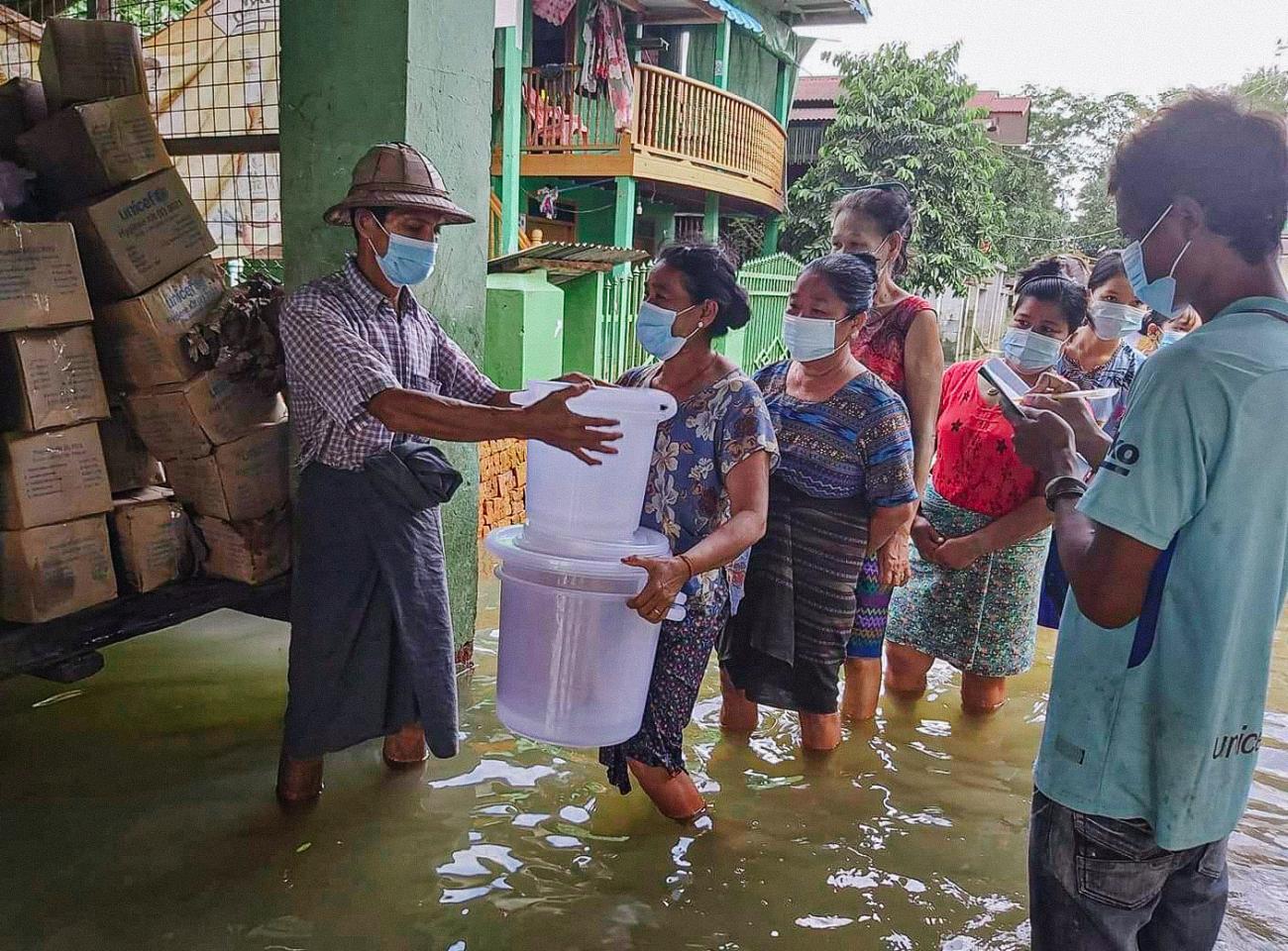In some areas of Myanmar during this year’s devastating monsoon season, floods have been up to six feet [two metres] deep. As rain battered homes and water levels began to rise, Mi Sazai’s anxiety levels soared.
The relentless downpour left 21-year-old Mi Sazai and the other nine members of her family – four of them children – stranded for two weeks in the upper room of their wooden home in Kyaik Maraw Township, in the southern State of Mon.
“I was scared that our house would be submerged,” she says. “And I was scared of a landslide.”
Earlier this year a landslide at her school killed one person, and she also recalls the deaths of 60 people two years ago in a nearby village, after the massive landslide that followed heavy rains like these.
“I was also worried about my sick mother running out of her medicines, and all of us having no food.”
The family desperately tried to cope by moving their belongings to the second floor, reducing meals from three to two a day, and collecting and boiling rainwater to drink.
“The only one who didn’t worry was my three-year-old niece as, fortunately, she didn’t know what was going on,” says Mi Sazai.
Monsoon season – one more terrifying challenge
Since July 25, floods have destroyed thousands of homes in townships in southern and eastern Myanmar and in the western State of Rakhine. The rains come amidst a third wave of COVID-19 and violent clashes between the military and local armed groups.
UNICEF is working with local NGO partners to distribute relief supplies to the communities affected by the floods. For example, in Mi Sazai’s village, UNICEF partnered with a local NGO, the Women and Child Organization.
Its director, Hong Sar Htaw, explains that boats were used to reach stranded households; teams also organized distribution of supplies to those taking refuge on higher ground at monastery sites, including water purification sachets, soap, disinfectant, buckets, sanitary packs, buckets and flip flops. Provided by UNICEF, these items reach more than 2,000 flood victims including Mi Sazai’s family. “We were so thankful to receive this help,” she says.
Although the monsoon floods occur each year, Hong Sar says that this season has proved the most challenging she’s known in the 15 years since she started working with Women and Child Organization. “We are having to take risks – risking our health with COVID-19 and our safety due to the security situation. So, we are thankful to UNICEF for supporting our efforts,” she says.
Hong Sar says she is particularly concerned for mothers-to-be and the sick because health services in the area have been extremely limited. And although the waters have subsided, they have left behind thick mud and overflowing sewage drains. People are at risk of water-borne diseases such as diarrhoea and foot infections – many walk barefoot, especially women.
“We still need more supplies, particularly medical supplies and food as well as hygiene education for the affected communities,” says Hong Sar.
Threatened livelihoods
Many people have lost their livelihoods, particularly casual labourers who worked in the paddy rice fields which are now inundated with flood water. COVID-19 travel restrictions and security measures make it impossible for them to seek work elsewhere.
Hong Sar says many are resorting to money lenders to pay for food for their families. “They get a loan for three months at seven per cent interest. If they can’t pay it off, then they borrow again with additional interest. They are caught up in a vicious cycle of debt.”
UNICEF’s humanitarian efforts continue. UNICEF has recently completed 20 delivery missions to other states which include 5,000 hygiene kits benefitting 25,000 people, 200 first aid kits for 30,650 people and water purification powder for 18,240 people. UN official figures suggest that, in total, about three million people in Myanmar need urgent assistance.
Meanwhile, humanitarian supplies continue to be delivered to Mi Sazai’s community.
“We will continue to deliver much-needed humanitarian supplies despite any danger and other challenges we may face,” says UNICEF programme officer Ye Min Aung. “I want to use my expertise to help my community.”
Mi Sazai is determined to find a way to do her part too. As a geography student, she is learning about the impact of climate change. “I want to research climate change to find out how we can prevent this from happening again,” she says with passion.





